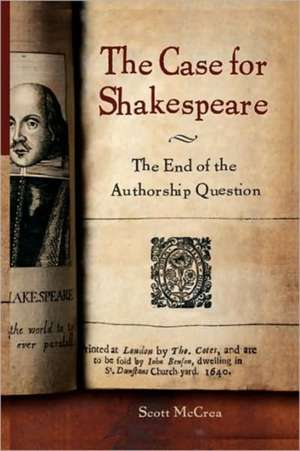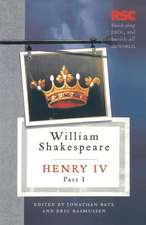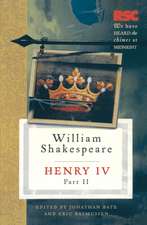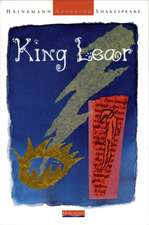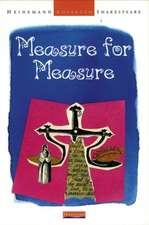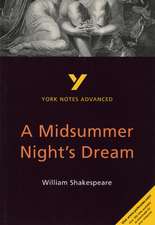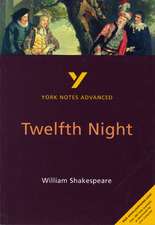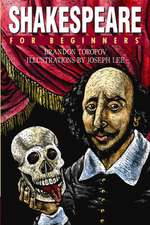The Case for Shakespeare: The End of the Authorship Question
Autor Scott McCreaen Limba Engleză Paperback – 29 ian 2005 – vârsta până la 17 ani
| Toate formatele și edițiile | Preț | Express |
|---|---|---|
| Paperback (1) | 173.88 lei 6-8 săpt. | |
| Bloomsbury Publishing – 29 ian 2005 | 173.88 lei 6-8 săpt. | |
| Hardback (1) | 357.81 lei 6-8 săpt. | |
| Bloomsbury Publishing – 29 ian 2005 | 357.81 lei 6-8 săpt. |
Preț: 173.88 lei
Preț vechi: 224.83 lei
-23% Nou
Puncte Express: 261
Preț estimativ în valută:
33.28€ • 34.61$ • 27.47£
33.28€ • 34.61$ • 27.47£
Carte tipărită la comandă
Livrare economică 14-28 aprilie
Preluare comenzi: 021 569.72.76
Specificații
ISBN-13: 9780313361777
ISBN-10: 0313361770
Pagini: 296
Dimensiuni: 156 x 235 x 16 mm
Greutate: 0.42 kg
Editura: Bloomsbury Publishing
Colecția Praeger
Locul publicării:New York, United States
ISBN-10: 0313361770
Pagini: 296
Dimensiuni: 156 x 235 x 16 mm
Greutate: 0.42 kg
Editura: Bloomsbury Publishing
Colecția Praeger
Locul publicării:New York, United States
Notă biografică
SCOTT MCCREA is on the faculty of the Conservatory of Theatre Arts and Film at the State University of New York, Purchase College. He is also a playwright.
Cuprins
IllustrationsAcknowledgmentsPrologue: Sleight of HandThe Man Who Wrote the PlaysTwo ShakespearesThe Third ManThe VacuumReasonable DoubtsLawyer's FingersThe Courtier's TongueThe SonneteerFootprints in the GardenThe Man Who Didn'tSuspectsThe AccusedMotive and MeansHave the BodyThe LogjamGrief and StrifeAll Conspiracy Theories Are AlikeNotes and ReferencesBibliography
Recenzii
McCrea establishes conclusively that Shakespeare, the Stratford-born actor--not Edward de Vere, 17th Earl of Oxford, or Marlowe, Bacon, or anyone else--did in fact compose the works attributed to him. . . . Essential. All collections; all levels.
McCrea's position on the authorship question is instantly clear: he refers to those who deny that Will Shakespeare of Stratford is the author of the sonnets and plays credited to him as heretic. . . . McCrea examines all available biographical evidence about the Stratford Shakespeare. Because this evidence is scanty and does not prove or disprove Shakespeare's authorship, he supports his conclusions with ample quotes from primary materials and references to scholarly studies. Readers can judge for themselves whether to agree or disagree. . . . Recommended for all libraries needing to balance out collections about the authorship question.
This is the latest in an honourable line of books reaffirming Shakespeare's authorship. . . . The Case for Shakespeare gives reliable and well argued accounts of both sides, bringing out the sleight of hand, specious logic, imaginary evidence, misdirection and above all subjective approaches that have spawned so many rival candidates.
. . .. hundreds of examples of historical and literary consilience have been compiled by Purchase College theatre professor and playwright Scott McCrea in his aptly titled book The Case for Shakespeare (Praeger, 2008), which demonstrates beyond a reasonable doubt that, in the Bard's own words from Julius Caesar, Shakespeare was not just a man but the man. . .
McCrea's position on the authorship question is instantly clear: he refers to those who deny that Will Shakespeare of Stratford is the author of the sonnets and plays credited to him as heretic. . . . McCrea examines all available biographical evidence about the Stratford Shakespeare. Because this evidence is scanty and does not prove or disprove Shakespeare's authorship, he supports his conclusions with ample quotes from primary materials and references to scholarly studies. Readers can judge for themselves whether to agree or disagree. . . . Recommended for all libraries needing to balance out collections about the authorship question.
This is the latest in an honourable line of books reaffirming Shakespeare's authorship. . . . The Case for Shakespeare gives reliable and well argued accounts of both sides, bringing out the sleight of hand, specious logic, imaginary evidence, misdirection and above all subjective approaches that have spawned so many rival candidates.
. . .. hundreds of examples of historical and literary consilience have been compiled by Purchase College theatre professor and playwright Scott McCrea in his aptly titled book The Case for Shakespeare (Praeger, 2008), which demonstrates beyond a reasonable doubt that, in the Bard's own words from Julius Caesar, Shakespeare was not just a man but the man. . .
